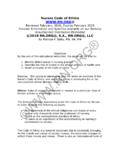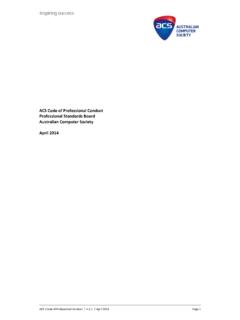Transcription of Code of Ethics and Standards of Practice Handbook
1 code of Ethics and Standards of Practice Handbook Second Edition 2008 Includes amendments to the Standards of Practice , effective October 1, 2010, February 13, 2011, May 6, 2015, January 1, 2018 and September 7, 2018. code OF Ethics The Ontario College of Social Workers and Social Service Workers regulates two professions, social workers and social service workers. The following sets out the code of Ethics for members of the College: 1) A social worker or social service worker shall maintain the best interest of the client as the primary professional obligation; 2) A social worker or social service worker shall respect the intrinsic worth of the persons she or he serves in her or his professional relationships with them; 3) A social worker or social service worker shall carry out her or his professional duties and obligations with integrity and objectivity.
2 4) A social worker or social service worker shall have and maintain competence in the provision of a social work or social service work service to the client; 5) A social worker or social service worker shall not exploit the relationship with a client for personal benefit, gain or gratification; 6) A social worker or social service worker shall protect the confidentiality of all professionally acquired information. He or she shall disclose such information only when required or allowed by law to do so, or when clients have consented to disclosure; 7) A social worker or social service worker who engages in another profession, occupation, affiliation or calling shall not allow these outside interests to affect the social work or social service work relationship with the client.
3 8) A social worker or social service worker shall not provide social work or social service work services in a manner that discredits the profession of social work or social service work or diminishes the public's trust in either profession; 9) A social worker or social service worker shall advocate for workplace conditions and policies that are consistent with this code of Ethics and the Standards of Practice of the Ontario College of Social Workers and Social Service Workers; 10) A social worker or a social service worker shall promote excellence in his or her respective profession; 11) A social worker or social service worker shall advocate change in the best interest of the client, and for the overall benefit of society, the environment and the global community.
4 The 1983 and the 1994 Canadian Association of Social Workers (CASW) Codes of Ethics have been used with the permission of CASW. The Social Work code of Ethics (1994) adopted by the CASW Board of Directors is effective January 1, 1994 and replaces the CASW code of Ethics (1983). code OF Ethics Explanatory Note .. iv Acknowledgements .. vi Scopes of Practice .. 7 Principle I: Relationship with Clients .. 9 Principle II: Competence and Integrity .. 11 Principle III: Responsibility to 16 Principle IV: The Social Work and Social Service Work Record .. 19 Principle V: Confidentiality.
5 27 Principle VI: Fees .. 32 Principle VII: Advertising .. 34 Principle VIII: Sexual Misconduct .. 38 Glossary .. 41 Standard of Practice for Social Workers Communicating Post Evaluation, A Finding of Incapacity with Respect to Admission to Care Facilities or Personal Assistance .. 45 iv EXPLANATORY NOTE The purpose of the Standards of Practice is to provide assistance to members of the Ontario College of Social Workers and Social Service Workers and to promote excellence in their Practice . The Standards of Practice Handbook sets out minimum Standards of professional Practice and conduct.
6 This is in accordance with one of the objects of the College as stated in the Social Work and Social Service Work Act, 1998 "to establish and enforce professional Standards and ethical Standards applicable to members of the College. For the purposes of the Act (Section 26), and the Professional Misconduct Regulation (Ontario Regulation 384/00), these Standards have been approved in a by-law of the College as Standards of Practice for its members. The Standards of Practice are meant to be applied to members Practice in conjunction with any applicable legislation and with their professional judgement.
7 The Standards of Practice Handbook applies to the breadth and scope of social work Practice and social service work Practice . It is recognized that throughout the scope of Practice for each profession, there are variations in approaches and that members vary their methods in response to the demands of a particular situation. The Principles and Interpretations contained within the Standards of Practice Handbook prescribe the basis on which professional Practice is conducted in a sound and ethical manner. Meaning of Client Social workers and social service workers provide services to a wide spectrum of clients or client systems.
8 In the broad sense, the term client refers to any person or body that is the recipient of social work or social service work services. In defining the client or client system a member could ask the question: To whom do I have an obligation in respect to the services I am providing? The term client refers to an individual, a family, group, community, organization or government. In research, the client may be a participant and in education, the client may include Types of Practice Social workers and social service workers also provide a wide range of services that encompass direct and indirect Practice and clinical and non-clinical interventions.
9 Direct Practice refers to professional activities on behalf of clients in which goals are reached through personal contact and immediate influence with those seeking services. Indirect Practice refers to professional activities that do not involve immediate or personal contact with the client being For social workers, clinical Practice refers to the professional application of social work theory and methods to the treatment and prevention of psychosocial dysfunction, disability or impairment, including but not limited to emotional and mental For social service workers, clinical Practice refers to the professional application of social service work theory and methods to the treatment and prevention of social dysfunction.
10 Disability or impairment, including but not limited to emotional or mental disorders. It is important to note that the contexts of Practice may overlap. For example, a member may provide counselling (direct-clinical), information and referral (indirect-clinical) to the same client. A member may EXPLANATORY NOTE v provide social support to clients in a social-recreational group (direct-non-clinical) or may administer a human service program (indirect-non-clinical). The Standards of Practice Handbook contains eight Principles. For each Principle, Interpretations are provided as Standards that guide College members.













